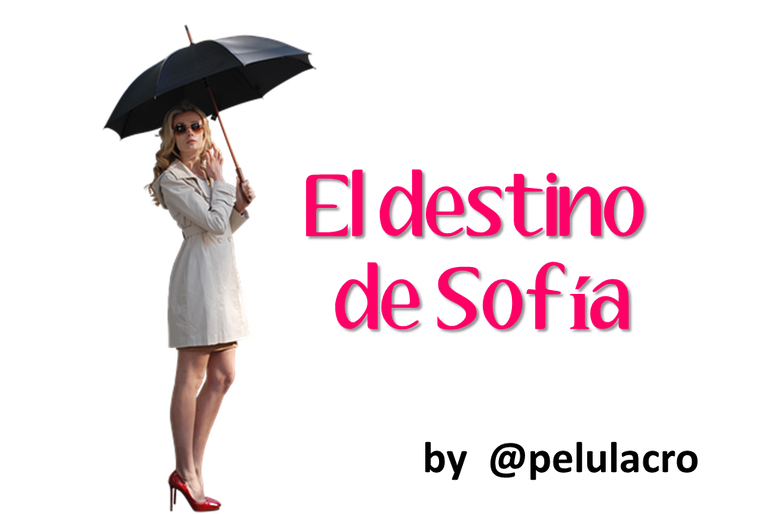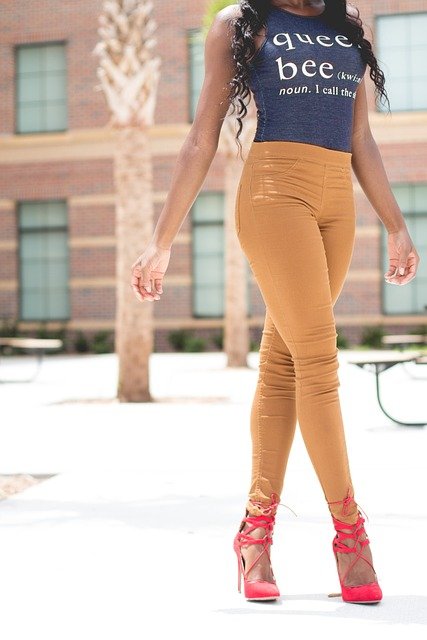
Foto de Imagen editada de [Pixabay] https://pixabay.com/es/photos/mujer-sombrilla-lluvia-gente-ni%C3%B1a-3388279/>
Sofía despertó temprano, como siempre. Se desperezó con los ojos cerrados, los cuales fue abriendo lentamente para ver lo mismo: hacia su derecha, el espacio vacío del hombre que se fue hace más de un año, un poco más allá la ventana de persianas a través de la cual observa el cielo despejado y los techos de otras casas.
-Gracias Señor, por otro día más de vida que no sé a dónde me lleva- Dijo mientras se miraba en el espejo. Salió del cuarto y se dirigió al baño.
-Buenos días mis angelitos, es hora de pararse para ir a la escuela- Dijo en voz alta cuando ya entraba al baño.
La casa era una humilde vivienda de dos habitaciones, un baño, y un saloncito que servía de sala, comedor y cocina al mismo tiempo. Tenía un pequeño patio. El apartamento estaba en una edificación de cuatro pisos de humildes viviendas, con paredes de bloques de arcilla, sin frisar por fuera, en uno de los 47 barrios de Petare.
Cuando salió del baño se encontró con sus hijas gemelas, Sol y Luz, que esperaban para entrar; las abrazó amorosamente y las apuró para que se alistaran. Eran niñas hermosas de unos ocho años que asistían a clases en una escuela pública en Palo Verde. Sofía se dirigió a la cocina para preparar desayuno. Pocos minutos después escuchó perfectamente el grito al unísono de las niñas:
-¡Mamí, hay reunión de representantes, no te olvides!- Dijeron.
-¡Por Dios!-dijo Sofía- ¡Casi que olvido la reunión y no sé qué ponerme, carajo!- Exclamó.
Corrió a su cuarto y comenzó a buscar otra ropa en el armario y las gavetas; rápidamente seleccionó lo que se pondría para salir, colocando las prendas sobre la cama. Buscó los zapatos y entonces palideció: solo encontró uno de los zapatos tenis que usaba a diario y comenzó a buscar por toda la habitación y luego en el salón, la habitación de las niñas y por último en el baño. Caminaba apurada con el viejo zapato en la mano.
-Chicas, ¿han visto mi otro zapato?- les preguntó mostrándoles el zapato.
-El zapato lo cargaba Puchi ayer; estaba jugando y se lo llevó para la calle cuando se juntó con Bellaco- Dijo Sol- Ese Puchi se llevó los restos de un zapato viejo- Dijo riéndose la pequeña.
-¡Un día de éstos voy a lanzar a Puchi por la ventana!- Dijo.
Sofía se vistió rápidamente mientras las niñas desayunaban; buscó en una caja y sacó unos zapatos rojos, de tacones altos y el vestido que usó en su boda con el flaco Remigio y ocasionalmente, en alguna fiesta. Escogió otras prendas a tono con los zapatos de tacón y se vistió. Se peinó y maquilló cuidadosamente y salió calle abajo a llevar a las niñas a la escuela. Las niñas hacían bromas con la indumentaria de su madre que a su juicio lucía muy atractiva y espectacular. Después de la reunión pasó por el mercado; compró frutas y aprovechó las ofertas en zanahorias y otras hortalizas.
De regreso a casa, no dejaba de pensar en sus hijas y el panorama que tenía por delante sin empleo ni seguridad. El dinero que le dejó Remigio se acabaría en cualquier momento.
Cuando su pareja se fue del país, con un grupo de hombres que decidieron buscar mejor destino en Colombia; viajaron en autobús hasta la frontera. El hombre la llamó desde Cúcuta para contarle que estaba bien y que unos panas lo estaban entusiasmando para que no se quedara en Colombia, que mejor era seguir hacia Ecuador y luego Perú, a pie, en moto o en autobús; y otra gente le hablaba de meterse en una caravana que se dirigía a Panamá para atravesar América central rumbo a los Estados Unidos.
Fue su última llamada y desde hacía unos 15 meses no tuvo más noticias de su paradero. Ninguno de los que se fueron con él regresó al barrio y sus familiares también perdieron contacto. Su desconcierto se convirtió en preocupación permanente y amargura por las tenebrosas noticias que circulaban por las redes sobre la cantidad de heridos, muertos y desaparecidos, tanto en Perú como en la selva de Darién y en las diversas rutas que los caminantes tomaron después de salir de Venezuela.
Solo la dedicación que brindaba a sus hijas aliviaba su dolor y angustia. El amor por sus niñas era el único aliciente para continuar viviendo por su obligación de madre; pero sin empleo, el futuro no lucía nada prometedor. Sentía que su destino estaba signado para afrontar la más dura realidad. Estaba sola; su madre vivía en Ciudad Bolívar y no podía ayudarla.
Cuando pasó cerca de la puerta del Bar La Casa del Pez, tropezó aparatosamente con Dimas Jr.; hijo del propietario del night club. El joven se disculpó rápidamente, visiblemente sorprendido y agradado por la hermosura y belleza de Sofía.
-Discúlpame Sofi- Dijo; tomándole la mano y besándola en la mejilla- No te esperaba por aquí; pero eres bienvenida. Qué elegante estás. Eres una de las mujeres más bellas que jamás haya conocido- Dijo Junior complacido.
-No venia para acá Junior; solo pasaba por aquí hacia la farmacia; vengo del mercado y debo pasar por Farmatodo-¿Cómo estás?- Respondió la joven mujer.
-Estoy bien, bien; pero estaría mejor si tú estuvieras aquí como antes- Dijo Junior- Sabes que ésta es tu casa; siempre serás bienvenida; hay mucho trabajo y todos pagan en dólares; no tienes que venir todos los días porque sé que eres mamá, pero puedes venir tres noches por semana; te doy 60/40 más la comida y transporte; ¿Qué te parece? No creo que el Flaco regrese a Venezuela, dejó muchas deudas pendientes y unos cuantos lo andan buscando, entre ellos los tombos. Yo quiero ayudarte, sabes que siempre me has gustado. ¿Qué más puedo ofrecerte cariño? Dime ¿Qué quieres?- Dijo Junior sonriendo amistoso.
-Una cerveza- Dijo Sofía, reprimiendo sus lágrimas, esforzándose por sonreír.


Sofia woke up early, as always. She woke up with her eyes closed, which she slowly opened to see the same thing she had seen for more than a year: to her right, the empty space of the man who left a little more than a year ago, a little further the shuttered window through which she could see the clear sky and the roofs of other houses.
-Thank you Lord, for another day of life that I don't know where it is taking me," he said as he looked at himself in the mirror. She left the room and went to the bathroom.
-Good morning my little angels, it's time to get up for school," she said aloud as she entered the bathroom.
The house was a humble dwelling with two bedrooms, a bathroom, and a small living room that served as living room, dining room and kitchen at the same time. It had a small patio. The apartment was in a four-story building of humble dwellings, with walls made of clay blocks, with no outside walls, in one of the 47 neighborhoods of Petare.
When she came out of the bathroom she found her twin daughters, Sol and Luz, waiting to go in; she hugged them lovingly and hurried them to get ready. They were beautiful girls of about eight years old attending classes at a public school in Palo Verde. Sofia went to the kitchen to prepare breakfast. A few minutes later she heard the girls shouting in unison:
-Mommy, there's a representatives' meeting, don't forget!" they said.
-Oh my God," said Sofia, "I almost forgot about the meeting and I don't know what to fucking wear!
She ran to her room and started looking for other clothes in the closet and drawers; she quickly selected what she would wear to go out, placing the clothes on the bed. She looked for her shoes and then paled: she found only one of the tennis shoes she wore every day and began to look all over the room and then in the living room, the girls' room and finally in the bathroom. She walked hurriedly with the old shoe in her hand.
-Have you girls seen my other shoe," she asked, showing them the shoe.
-Puchi was carrying the shoe yesterday; he was playing and took it to the street when he met Bellaco," said Sol, "That Puchi took the rests of an old shoe," said the little girl laughing.
-One of these days I'm going to throw Puchi out of the window," she said.
Sofia got dressed quickly while the girls were having breakfast; she looked in a box and took out some red shoes with high heels and the dress she wore to her wedding with the skinny Remigio and occasionally to a party. She chose other clothes to match the high heels and got dressed. She carefully combed her hair and made-up and went down the street to take the girls to school. The girls made jokes about their mother's outfit, which they thought looked very attractive and spectacular. After the meeting she went to the market; she bought fruit and took advantage of the specials on carrots and other vegetables.
Back home, she kept thinking about her daughters and the prospect ahead of her with no job and no security. The money Remigio left her would run out at any moment. When her partner left the country, with a group of men who decided to look for a better destination in Colombia, they traveled by bus to the border. The man called her from Cúcuta to tell her that he was fine and that some friends were encouraging him not to stay in Colombia, that it was better to continue to Ecuador and then Peru, on foot, by motorcycle or by bus; and other people were talking to him about joining a caravan that was heading to Panama to cross Central America towards the United States.
That was his last call and for the last 15 months he had no news of his whereabouts. None of those who left with him returned to the neighborhood and his relatives also lost contact. His bewilderment turned into permanent worry and bitterness because of the gloomy news that circulated through the networks about the number of wounded, dead and missing, both in Peru and in the Darien jungle and in the various routes that the walkers took after leaving Venezuela. Only the dedication she gave to her daughters relieved her pain and anguish. Her love for her children was the only incentive to continue living because of her obligation as a mother; but without a job, the future did not look promising. She felt that her destiny was destined to face the harshest reality. She was alone; her mother lived in Ciudad Bolivar and could not help her.
As she passed near the door of the Bar La Casa del Pez, she bumped into Dimas Jr; son of the night club owner. The young man quickly apologized, visibly surprised and pleased by Sofia's beauty.
-He said, taking her hand and kissing her on the cheek, "I wasn't expecting you here, but you are welcome. How elegant you look. You are one of the most beautiful women I have ever met," Junior said pleased.
-I wasn't coming here, Junior; I was just passing by on my way to the pharmacy; I'm coming from the market and I have to stop by Farmatodo, how are you?
-I'm fine, fine; but it would be better if you were here like before- Said Junior- You know this is your home; you will always be welcome; there is a lot of work and everyone pays in dollars; you don't have to come every day because I know you are a mom, but you can come three nights a week; I give you 60/40 plus food and transportation; what do you think? I don't think El Flaco will return to Venezuela, he left many debts pending and some people are looking for him, among them the Tombos. I want to help you, you know I have always liked you, what else can I offer you honey? Tell me what do you want," said Junior smiling friendly.
-**A beer," said Sofia, repressing her tears, trying hard to smile.

Foto de Imagen editada de [Pixabay] (https://pixabay.com/es/photos/ni%C3%B1a-mujer-moda-ropa-tacones-2607128/)>

- Separadores elaborados en Canva
- 100% contenido original
- Traducción realizada con DeepL


Me gustó mucho su cuento profesor @pelulacro. Es una realidad caleidoscópica que deja el sabor de seguir leyendo: como toda buena literatura deja el pensamiento al vuelo. El final abierto con las palabras “Una cerveza”, se lo deja a la expectativa o las peripecias del lector en cuanto al después, qué pasó o cómo termina; pero lo cierto, a mi juicio, es que no hay final porque la historia de esta tragedia aún está en curso por las calles de un país golpeado por una crisis más grave y dolorosa que la que se vivió en el siglo XIX en los tiempos de la guerra de independencia. El fondo temático de su relato es la cruda realidad de uno de los graves problemas sociales que vive la gente de los barrios y las secuelas de una continuada emigración, sin precedentes en la historia venezolana. Saludos.
Gracias @luisacarola por leerme y brindarme tan acertado comentario interpretativo; saludos desde Caracas
Una triste realidad muy presente en nuestra sociedad desde que inició la diáspora venezolana, muchas familias fragmentadas, madres que se quedaron solteras a cargo de sus hijos... tantas realidades. muy bueno tu post
@tipu curate 8
Upvoted 👌 (Mana: 0/71) Liquid rewards.
Gracias por leerme y comentar e interpretar acertadamnete el tema, saludos desde Caracas
Buen escrito retrata una triste realidad, Saludos
Gracias por leerme y comentar; saludos @mogollono1862